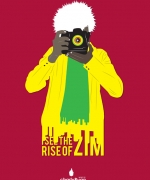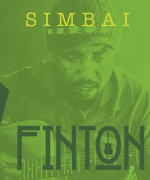David Chinyama and the 7 Day Theory
POVO: What is your take on the visual arts in Zimbabwe?
David: As of this year with the changes that have been taking place in our country, there is a lot that is coming up as far as I am concerned. I just recently finished my project, 7 Day Theory where I worked for 7 days and 7 nights locked up in a studio, in isolation and I managed to come up with a body of work that was exhibited at the National Art Gallery in April and the response was overwhelming. I also have four shows set for Europe and a lot of group exhibitions and I see the Zimbabwe visual arts rising up. Artists now feel the environment is now conducive for them to start working
POVO: Can you tell us about your Visual Poetry project?
David: Visual Poetry is my style; it’s my way of interpretation. I see my work as visual poetry in color which people can relate to in pictures. The 7 day theory is a continuation of the direction I am taking as an artist. As an artist, you grow with age as you see things, the environment and how it influences your work.
POVO: Tell us about your experience of being locked up in isolation for 7 days.
David: I can say it was a more progressive experience in terms of how I work and the influence that I got. There was a time in the past whereby my work was restricted. But during the 7 days I managed to open up and let the flow out of me control my work and see how each and every environment affects my work. It was an experience and my work will never be the same again. It has helped me see another direction and also view my work from another perspective; taking me in another direction I never thought possible.
POVO: Is the 7 day theory applicable to people in general in their lives and work?
David: The theory is all about the challenges we face in life and it involves a lot of thinking. So there’s a time in life when we get new challenges, we have to think of ways of getting out of those challenges, ways of making a better tomorrow, thinking of ways of trying to bring in new ways and directions. Simply put, it’s an interpretation of the ordinary way we do things, how we try to change and live differently.
POVO: Tell us about your collaboration with Masimba Hwati at HIFA. Is this an ongoing relationship?
David: I think there is going to be a lot of collaborations coming up in most arts sectors as artist’s synergies help our work in some way. We complement each other in some way because of the strengths we have. I have worked with Masimba for more than seven years now and there has been mutual encouragement and inspiration for us. I think I can say our collaboration is a match made in heaven. Each and every project that I think of the first person that comes to my mind is Masimba. I have other initiatives coming up where I have proposed to work with Comrade Fatso and Willis Watafi whereby their performance includes the visual and performing arts to give the audience a new direction of art.
POVO: How is the reception for the visual arts in Zimbabwe?
David: Previously art has been classified as a preserve of the elite. Even if you go into our schools the curriculum is mainly the Group A schools and the elite schools that would do art. The ordinary schools in the townships and the rural areas never took art as a subject. So now I think declassifying it, trying to take art to the people, to the ordinary man in the rural areas and try to teach them at a very tender age. It’s time we got into our communities as artists, and school curriculums be introduced at least try to teach those people about the visual art. But you will find that the pictures and the paintings are an interpretation of their day to day lives. So I think starting with a younger generation, which will grow up with that appreciation in their mind.
POVO: What do you think is government responsibility in this?
David: I think make as much art available in the public space so that the general populace has access to art. Even residents of Harare don't know anything about the Art Gallery. To them the gallery is for the elite. I think government has to open up spaces whereby artists go into communities, give space on buildings within the city center to the artists to produce artworks that are for the nation and the city itself so that every ordinary man has access to the art.
POVO: Do you think that there might be a fear of the emancipation of the masses as well through visual art?
David: The government has laws like POSA (Public Order Security Act) to counter public disorder since art is a commentary of what happened as per the artist interpretation. Maybe to them the time is not yet ripe for artists to have that opportunity to interpret. I believe that by opening up spaces where people can interact, government can enable open dialogue.
POVO: So it can almost be a broad stereotype
David: It’s a stereotype of some sort. The arts industry itself, the ministry that oversees it is not entirely dedicated to the industry but is representative of Education, Sports, Arts and Culture. If there was a Ministry of Arts and culture on its own that spearheads the welfare of the arts at least maybe the guys in the government may have a knowhow of what the arts are about. As artists we see ourselves as commentators, we do help in nation building through information dissemination, we record events that happen within our society, and we try to educate people on certain issues through our works. I think the best thing would be having the artists themselves run the arts industry, and try to map a way forward. There are a lot of eligible artists who have the necessary exposure, like Chaz Maviyane-Davies, a son of Zimbabwe, doing quite well in the United States. As artists we are there to solve problems. Whatever problems artist may have at any one time, artists can have a solution; give them that chance to come up eight a solution.
POVO: Maybe we can also defend the government in a way and say that the artist themselves don't want to engage, it becomes politics and maybe they don't want to take up political office?
David: Artists have always been social commentators who tend to do things sometimes that are unpredictable. We try to interpret our feelings, our challenges through our art; each and every situation that happens in our life does affect our work. The only way we can get over whatever challenges or whatever we are going through our art is interpreting it through our works visually or in performance. I think that’s one of the things some of the guys in top positions feel threatened with.
POVO: Are you a part of any art associations here in Zimbabwe and how are they benefitting the artists?
David: I am a party to a couple of organizations, including the African network on the visual arts called African Colours Artists Association with offices across Africa. Initially it was started here in Zimbabwe then wnehn things got bad head office was moved to Kenya in 2000. I am also part of the Creative Africa Network. And another group I started with Masimba Hwati called Studio Harare. We are trying to set up a studio and resource center for artists whereby we are going to bring artist and give them space, a resource center where they can access whatever information, workshops, residences being given across the world, so we are still looking for space. It is registered and everything is in order now. Hopefully by early next year we will be starting.
POVO: In terms of administrative things like copyrights is there an association that represents artists in Zimbabwe?
David: Not really. Only lately on the music side they have formed the association that safeguards against piracy. As for the visual arts nothing has been done yet. I think it all goes back to the government, as a government they have to come up with laws that enforce and safe guard the interests of the artists. You can form an organization but if there are no laws or bylaws that support us then there is nothing we can do.
POVO: Tell us about your upcoming tours. Where to and for how long?
David: My first port will be Germany, Munich I have a 7 Day Theory 2 show coming up then for the next two months I have two more exhibitions in Avignon and Paris in France.
POVO: So the work that you create, say the 7 Day Theory 2. Who does that work belong to?
David: The work belongs to me but it’s a Zimbabwean story. It’s an interpretation of the Zimbabwean story and challenges for the past 10 years. I will work for 7 days and 7 nights and we will try to market it as much as possible, I think we are going to have the BBC and CNN and all the media houses covering the event. We would like the world out there to know the challenges we have faced as ordinary Zimbabweans. After that we will have an exhibition or an auction. Part of the money, I have a project that I have been running now for years called Art For Hope, in conjunction with the US embassy. So part of the proceeds will go into helping under privileged children in our country
POVO: Tell us about Art for Hope as an organization.
David: It’s unfortunate that in the past three years we never had any exhibitions because I had left the country and most of the guys had left the country and some of the challenges we were facing on the individual art side had gone down. I am thinking of reviving it this year, even when I am not around we have come up with a committee of guys who are going to be running the project .
POVO: Will that be in the form of exhibitions and workshops?
David: This year its going to be exhibitions like before but next year we are thinking of taking artists on a retreat, whereby we will have a week or two weeks, outside where they work and produce work then have an exhibition or three day fare and part of the proceeds go to Art for Hope.
POVO: Any shows here in Zimbabwe this year?
David: My last exhibition for this year will be at the Mutare National art gallery on the 27th. I am almost done with the works and waiting for the day.




